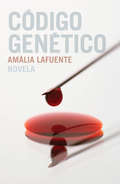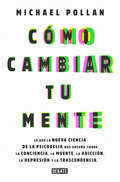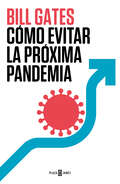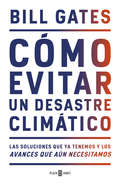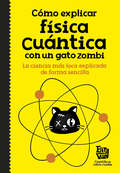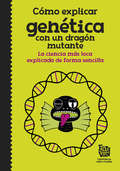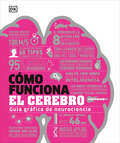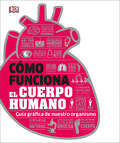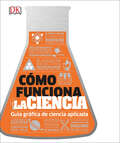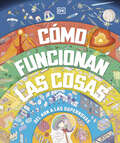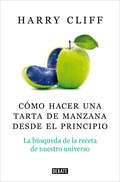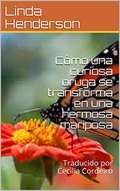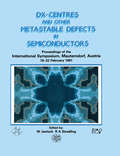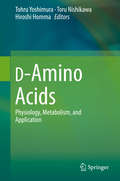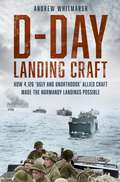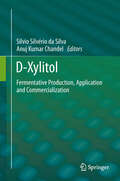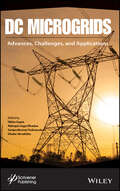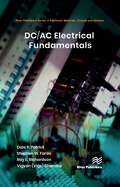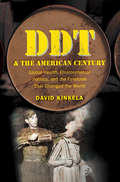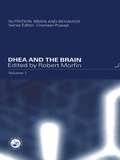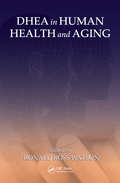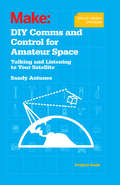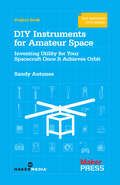- Table View
- List View
Código genético
by Amàlia LafuenteMarina Fontcuberta, becaria posdoctoral, es la encargada de una línea de investigación sobre un fármaco contra el Alzheimer. Cuando llega un nuevo director al Instituto de Neurociencias, avalado por una carrera brillante en Estados Unidos, él apoya su trabajo con gran interés. Sin embargo, Marina descubrirá que las atenciones que le presta sobrepasan el terreno profesional y se verá obligada a tomar una decisión que podría poner toda su carrera en peligro.Amàlia Lafuente retrata con habilidad el mundo de la investigación científica: la rivalidad entre los becarios, el abuso de poder de los triunfadores, la competitividad, los juegos de seducción entre colegas de profesión...Con todos los ingredientes del mejor thriller, Código genético atrapa al lector con un tema de actualidad y unos personajes de carne y hueso.
Cómo cambiar tu mente: Lo que la nueva ciencia de la psicodelia nos enseña sobre la conciencia, la muerte, la adicción, la depresión y la transcendencia
by Michael PollanUna brillante y valiente investigación de Michael Pollan, autor de cinco best sellers de The New York Times, sobre la revolución médica y científica en torno a las drogas psicodélicas, y la fascinante historia de sus propias experiencias psicodélicas que le cambiaron la vida. Cuando Michael Pollan se propuso investigar por qué el LSD y la psilocibina (el ingrediente activo de las setas mágicas) brindaban un enorme alivio a las personas que padecían condiciones difíciles de tratar como el TEPT (trastorno por estrés postraumático), la depresión o la adicción, no tenía la intención de escribir lo que es indudablemente su libro más personal. Pero al descubrir cómo estas notables sustancias estaban mejorando la vida no solo de los pacientes con problemas de salud mental sino también de las personas que simplemente se enfrentaban a los altibajos de la vida cotidiana, decidió explorar los límites de la mente en primera y tercera persona. Así comenzó una singular aventura entorno a la experiencia de la conciencia alterada, así como una profunda inmersión en el estudio de la neurociencia más pionera y la toma de contacto con una prodigiosa comunidad subterránea de expertos psicodélicos. En esta ejemplar investigación periodística, Pollan revisa archivos históricos y documentos científicos para separar la verdad sobre estas misteriosas drogas de los mitos, la propaganda y el pánico moral que se ha ido acumulando desde los años sesenta, cuando un puñado de personajes rebeldes catalizaron una poderosa reacción contra lo que entonces era un prometedor campo de investigación. Sugerente, polémico y deslumbrante este libro es el resultado de un viaje a una nueva, emocionante e inesperada frontera de la percepción, de nuestra comprensión de la mente, del yo y de nuestro lugar en el mundo.
Cómo evitar la próxima pandemia
by Bill GatesLa pandemia de la COVID-19 aún no ha terminado, pero mientras los gobiernos del mundo entero tratan de dejarla atrás, ya se plantean qué pasará a continuación. ¿Cómo podemos evitar que una próxima pandemia les arrebate la vida a millones de personas y hunda la economía global? ¿Podemos siquiera albergar la esperanza de alcanzar esta meta? Bill Gates cree que la respuesta es sí, y en este libro explica de un modo claro y convincente qué deberíamos haber aprendido de la COVID-19 y qué podemos hacer cada uno de nosotros para evitar un desastre parecido. Basándose en los conocimientos de los principales expertos mundiales y en su propia experiencia combatiendo enfermedades mortales a través de la Fundación Gates, logra, en primer lugar, ayudarnos a entender, desde un punto de vista científico, cómo funcionan las enfermedades infecciosas. Después, nos enseña que, si las naciones del mundo aúnan esfuerzos y al mismo tiempo trabajan codo con codo con el sector privado, no solo podrán prevenir otra catástrofe como la de la COVID, sino también eliminar todas las afecciones respiratorias, incluso la gripe. Este es un llamamiento intenso, exhaustivo y de suma importancia realizado por uno de nuestros más grandes y más eficaces pensadores y activistas. «En este libro, conciso a la par que coherente, Gates reflexiona sobre la COVID-19, considera futuras pandemias y propone recomendaciones sensatas para su prevención. Apasionado por el tema pero sin sentar cátedra, Gates hace un llamamiento razonado y consistente al mundo para que se una a fin de evitar próximas pandemias».Booklist «Gates aporta un análisis exhaustivo sobre cómo lo aprendido de la COVID-19 puede ayudar a desarrollar políticas globales de salud pública. Con una prosa accesible, detalla los pasos necesarios para evitar pandemias futuras, destacando la creación de un equipo internacional dedicado a ello».Publishers Weekly
Cómo evitar un desastre climático: Las soluciones que ya tenemos y los avances que aún necesitamos
by Bill GatesEn este libro tan necesario y riguroso, Bill Gates expone un plan amplio, funcional y, sobre todo, asequible, para reducir a cero las emisiones de los gases causantes del efecto invernadero y evitar a tiempo una catástrofe medioambiental. Bill Gates ha dedicado una década a investigar el cambio climático. Con la orientación de expertos en física, química, biología, ingeniería, ciencias políticas y finanzas, se ha centrado en determinar qué medidas debemos tomar para detener la carrera del planeta hacia un desastre ambiental irreversible. En este libro, el autor no solo reúne la información básica para que tomemos conciencia de la necesidad de eliminar las emisiones de los gases causantes del efecto invernadero, sino que también explica qué debemos hacer para alcanzar este objetivo tan importante. Gates nos ofrece una descripción lúcida de los desafíos a los que nos enfrentamos. Aprovechando sus conocimientos en innovación y en lo que supone introducir nuevos conceptos en el mercado, nos detalla cuáles son los campos en los que la tecnología ya está ayudando a reducir las emisiones, cómo y cuándo se logrará que la tecnología actual sea más eficaz, dónde necesitamos dichos avances y quiénes están trabajando en estas mejoras tan necesarias. Por último, traza un plan práctico y específico para llegar a las cero emisiones, tanto con políticas gubernamentales como a título personal, implicando así a gobiernos, a empresas y a nosotros mismos en esta crucial misión. Como advierte Bill Gates, cumplir el objetivo de las cero emisiones no será una tarea sencilla, pero sí está a nuestro alcance si seguimos sus pautas.
Cómo explicar física cuántica con un gato zombi: La ciencia mas loca explicada de forma sencilla
by Big Van Científicos Sobre RuedasSi eres de los que piensa que saber que el tiempo y el espacio son en realidad lo mismo no sirve para nada, o que lo único que le puede decir un protón a un electrón es que deje de ser tan negativo..., ¡has dado con la lectura que necesitabas! ¿Sabías que el teletransporte es real? ¿Que a veces un electrón tiene probabilidades de atravesar una pared? ¿Que dos partículas pueden influenciarse mutuamente aunque estén a años luz de distancia? ¿Y que las partículas cuánticas son como Clark Kent y disimulan sus poderes cuando los científicos las están observando? En Cómo explicar la física cuántica con un gato zombi descubrirás que, aunque no lo parezca, la física cuántica está por todas partes en nuestra vida cotidiana. Y además aprenderás... ...¡los principios más locos y flipantes de la física cuántica! ...¡experimentos low cost que puedes hacer en tu casa! ...que los científicos están un poco pallá, ¿lo sabías? ...y que los gatos tampoco son muy normales que digamos... Los lectores dicen...«Un libro de lo más instructivo a la par que divertido. Hace que la ciencia o la física sea divertida y comprensible para los mundanos. En serio, apto para jóvenes y adultos. Un libro que te hace pensar y si quieres aprender, lo harás.»
Cómo explicar genética con un dragón mutante
by Big Van Científicos Sobre RuedasSi crees que ADN son las siglas de un país muy muy lejano y que el bruto de la clase es el único que desciende del mono, ¡has dado con la lectura que necesitabas! Este divertido libro ilustrado explica la genética y la evolución... ¡de manera que lo entienda todo el mundo! ¿Sabías que existen los mutantes? ¿Que cualquier célula de tu cuerpo sabe más de ti que tus padres? ¿Y que algo llamado gen ha hecho que heredes la barbilla de tu bisabuelo (el guapo, claro)? En las páginas de Cómo explicar genética con un dragón mutante descubrirás... ...¡las leyes más extrañas y alucinantes de la genética! ...¡experimentos low cost que puedes hacer en tu casa! ...que los científicos están un poco pallá, ¿lo sabías? ...y que los pollos no son tan diferentes a los dragones...
Cómo fabricar un gas y otros experimentos raros que hago a veces
by GABRIEL LEONUn nuevo formato para la serie middle grade de ciencia más divertida. Pachi y su papá científico vuelven con una serie de aventuras que surgen a partir de preguntas raras. ¿Es posible fabricar un gas desde cero?, ¿el agua salada pesa más que el agua dulce? Descubre las respuestas a estas superinterrogantes de la manera más divertida: ¡con experimentos! Y la mejor parte es que puedes convertir tu casa en un laboratorio con cosas que de seguro tienes en la despensa.
Cómo funciona el cerebro (DK How Stuff Works)
by DKDescubre el funcionamiento de la estructura más compleja y enigmática que se conoce: el cerebro humano.¿Existen diferencias entre el cerebro de un hombre y de una mujer? ¿Por qué los adolescentes son impulsivos y rebeldes? ¿Cuándo podremos conectar nuestros cerebros a la nube? Encuentra las respuestas a estas y otras preguntas en el interior de este libro sobre el cerebro basado en las últimas investigaciones en neurociencia.¡Pasa las páginas para encontrar increíbles contenidos!-Texto simple y gráficos paso a paso con los que entenderás más fácilmente cómo funciona el cerebro.-Capítulos que abordan temas como la memoria, el aprendizaje, la conciencia, la personalidad, las emociones y la comunicación. -Datos curiosos y llamativas imágenes que te ayudarán a visualizar su estructura interior y su conexión con el resto del cuerpo.-Respuestas a las preguntas más frecuentes: cómo mejorar la memoria, la concentración o cómo dormir mejor. -Incluye una guía sobre los trastornos del cerebro, que incluye tanto problemas físicos, como tumores y accidentes cerebrovasculares, como trastornos psicológicos y funcionales, como el autismo o la esquizofrenia. Aprende cómo el cerebro regula la respiración y los latidos del corazón, cómo recopila información y se la envía a los órganos de los sentidos para generar una respuesta, y mucho más. ¡Descúbrelo todo sobre el órgano más misterioso del cuerpo humano y amplía tu conocimiento sobre anatomía! La colección de DK How it Works en español explica temas complejos de forma clara y visual a través de infografías, textos sencillos e información fácil de entender tanto para estudiantes como para lectores generales que quieran ampliar sus conocimientos.Are men's and women's brains really different? Why are teenagers impulsive and rebellious? And will it soon be possible to link our brains together via the Cloud?Drawing on the latest neuroscience research, this visual guide makes the hidden workings of the human brain simple to understand. How the Brain Works begins with an introduction to the brain's anatomy, showing you how to tell your motor cortex from your mirror neurons. Moving on to function, it explains how the brain works constantly and unnoticed to regulate heartbeat and breathing, and how it collects information to produce the experiences of sight, sound, smell, taste, and touch. The chapters that follow cover memory and learning, consciousness and personality, and emotions and communication.There's also a guide to the brain's disorders, including physical problems, such as tumors and strokes, and psychological and functional disorders, ranging from autism to schizophrenia. Illustrated with bold graphics and step-by-step artworks, and sprinkled with bite-sized factoids and question-and-answer features, this is the perfect introduction to the fascinating world of the human brain.
Cómo funciona el cuerpo humano: Guía gráfica de nuestro organismo (DK How Stuff Works)
by DKCómo funciona el cuerpo humano explora los maravillosos procesos que ocurren dentro de nuestro propio cuerpo, normalmente, sin que nos demos cuenta de ello.¿Por qué nos mareamos o sentimos mariposas en el estómago? ¿Qué ocurre cuando sentimos jetlag? Estas son solo algunas de las intrigantes preguntas a las que conseguirás dar respuesta con este maravilloso libro del cuerpo humano.Cómo funciona el cuerpo humano es una guía visual entretenida y accesible para conocer cada detalle de nuestro cuerpo, combinando la ciencia de los libros de anatomía humana con increíbles gráficas e ilustraciones a todo color.Descubre los secretos que esconde el cuerpo humanoExplora todas y cada una de las partes del cuerpo humano clasificadas por sistemas: el sistema respiratorio, endocrino, reproductor, circulatorio, digestivo, excretor, muscular, nervioso, esquelético, inmunológico, linfático e integumentario. Encuentra respuestas a preguntas cotidianas sobre lo que nos sucede en el cuerpo en el día a día. ¿Qué ocurre en el cuerpo cuando estamos estresados? ¿Cómo consiguen informarnos los sentidos del mundo a nuestro alrededor? ¿Cómo leemos la expresión de la cara de una persona a través del lenguaje no verbal? ¿Cuándo y cómo se activan los músculos del cuerpo?Este maravilloso libro del cuerpo humano apoya la comprensión de los textos con increíbles ilustraciones a color, las cuales muestran detalles y curiosidades que ayudan a descubrir todos los secretos que esconde nuestro cuerpo.Un viaje a nuestro interior a través de los siguientes capítulos:Bajo el microscopio.Un buen soporte.En marcha.Materia sensible.En el corazón del sistema.Entrada y salida.Sano y en forma.Equilibrio químico.El ciclo de la vida.Cosas de la mente.Cómo funciona el cuerpo humano, pertenece a la colección de libros juveniles en español de Conocimiento de la editorial DK, un rincón de nuestro catálogo destinado a mentes jóvenes curiosas que estén interesadas en conocer más sobre el mundo que les rodea, con disciplinas tales como la filosofía, economía y psicología. Los títulos incluidos en esta colección responden a infinidad de preguntas con un lenguaje sencillo y cercano y se apoyan en formidables ilustraciones y esquemas para ayudar a entender complejos asuntos y teorías que capten el interés del público juvenil, mientras desarrollan sus habilidades lectoras y sus conocimientos generales.
Cómo funciona la ciencia (DK How Stuff Works)
by DKEncuentra respuestas científicas a las preguntas que siempre te has hecho, desde que significa estar vivo hasta por qué explotan las cosas.Este libro de ciencia nos desvela todos los secretos del universo. Deslumbra a tus amigos y familiares con respuestas a las preguntas científicas cotidianas, como ¿cómo se mantienen los aviones en el aire? ¿Cómo funciona una computadora? ¡y mucho más!Mediante explicaciones claras, gráficos y esquemas visuales, este libro de ciencia en español explica conceptos científicos que no te enseñaron en la escuela, hasta los últimos descubrimientos y noticias científicas como el descubrimiento del Bosón de Higgs. ¡Verás que esto sí que es ciencia simplificada!Tanto para el estudiante de ciencias como para cualquier persona interesada en ampliar sus conocimientos en el campo científico.Este libro es el compañero ideal de El libro de la ciencia de la serie de Big Ideas (Spanish Edition)Ciencia: la mejor manera de entender el universo¿Qué es la materia, la energía, la vida, el espacio? ¡Estamos rodeados de ciencia! Aprende a identificar y a comprender cómo funciona desde la electricidad hasta la realidad virtual, desde la transmisión genética al envejecimiento. Explora el mundo de las estrellas, las galaxias y descubre cuál es el tamaño del universo. Esta guía sobre la ciencia nos descubre todos los aspectos sobre la existencia humana desde la mirada científica. Comprenderás cómo se forma la luz, el sonido, o la presión. Aprenderás a definir conceptos como la relatividad, la inteligencia artificial, la inteligencia física, la nanotecnología, los virus, la terapia genética, la física cuántica, la clonación e incluso el Big Bang.Una guía de referencia actualizada sobre todos los descubrimientos que nos regala la ciencia a día a de hoy, desde el origen del universo hasta los robots, a través de los siguientes capítulos:La materia.Energía y fuerzas.La vida.El espacio.La Tierra.Cómo funciona la ciencia, pertenece a la colección de libros juveniles en español de Conocimiento de la editorial DK, un rincón de nuestro catálogo destinado a mentes jóvenes curiosas que estén interesadas en conocer más sobre el mundo que les rodea, con disciplinas tales como la filosofía, economía y psicología. Los títulos incluidos en esta colección responden a infinidad de preguntas con un lenguaje sencillo y cercano y se apoyan en formidables ilustraciones y esquemas para ayudar a entender complejos asuntos y teorías que capten el interés del público juvenil, mientras desarrollan sus habilidades lectoras y sus conocimientos generales.
Cómo funcionan las cosas (How Everything Works)
by DKCada página de esta enciclopedia increíblemente detallada y ambiciosa te guiará a través de la naturaleza y la tecnología que tienes a tu alrededor. Ilustraciones enormes llenan las páginas y muestran en todo detalle qué hay dentro de los objetos y los edificios para enseñar cómo funcionan, explicando principios básicos (como la fotosíntesis), así como conceptos más amplios (como la interacción de todos los seres vivos que hay en una selva tropical). Los capítulos cubren desde el cuerpo humano, las ciudades y la industria hasta el planeta Tierra; patrones de sueño, cocina, sistemas de aguas residuales, parques eólicos, esporas de hongos y placas tectónicas y mucho más.'Cómo funcionan las cosas' es perfecto para cualquiera que tenga curiosidad sobre temas de ciencia, tecnología y matemáticas, o sobre la naturaleza y el mundo moderno en general.Each page of this mind-blowingly detailed and ambitious encyclopedia will guide you through the natural world and the technology that surrounds you. Giant, page-filling illustrations take objects apart – or take the roofs and walls off buildings – to show you how they work, explaining both basic principles (such as photosynthesis) as well as broader concepts (like how all the living things in a rainforest interact). Chapters range from the human body to cities and industry, to planet Earth, taking in sleep patterns, cooking, sewage systems, wind farms, fungi spores, and plate tectonics along the way.'Cómo funcionan las cosas' is perfect for anyone who would like to know moro about STEM subjects at school or is simply curious about how nature and the modern world work.
Cómo hacer una tarta de manzana desde el principio: La búsqueda de la receta de nuestro universo
by Harry CliffUn viaje a los orígenes del universo para responder a las preguntas fundamentales de la física moderna. Decía Carl Sagan que para hacer una tarta de manzana primero hay que crear el universo. Harry Cliff, prestigioso físico de la Universidad de Cambridge, emprende la búsqueda de la receta perfecta recogiendo los ingredientes a través del cosmos, en los núcleos de estrellas moribundas, y retrocediendo en el tiempo hasta la fracción de segundo inmediatamente posterior a la que todo se creó, para entender, entre otras muchas cosas, de dónde proviene la materia. Esta suculenta receta lo lleva del mayor laboratorio subterráneo del mundo, donde los científicos estudian el sol, al Gran Colisionador de Hadrones, en Suiza, donde se crea antimateria a diario. Un paseo por la historia de la física, la química y la astronomía, así como del recorrido que nos ha traído hasta nuestra comprensión actual del universo. En definitiva, uno de los viajes intelectuales más asombrosos que el ser humano ha sido capaz de emprender. La crítica ha dicho: «¿Cuál es el origen de todo? Harry Cliff tiene la capacidad de remangarse y responder a preguntas en apariencia filosóficas como esta. Una exploración fascinante sobre cómo hemos aprendido lo que es en realidad la materia, y el viaje que esta emprende desde el Big Bang, pasando por las explosiones estelares, hasta llegar a ti y a mí».SEAN CARROLL «Cliff sumerge a los lectores en el curioso y hermoso mundo del interior del átomo. Un libro asombroso, tan divertido como la Guía del autoestopista galáctico. Para todo aquel que quiera entender algunas de las preguntas científicas más importantes».Kirkus «Emocionante y revelador. Cliff describe ideas complejas de forma apasionante y accesible, y tiene la habilidad de hacer de la teoría algo divertido. Un viaje asombroso y entretenido que vale la pena saborear».Publishers Weekly «Escrito de manera amena y atractiva en la mejor tradición de Feynman y Sagan. Un auténtico page turner».JIM AL-KHALILI «Una mezcla perfecta de química, física, una pizca de astronomía y una gran cantidad de humor para obtener la receta de tarta de manzana más atractiva de todos los tiempos. Cliff hace un uso exquisito de las metáforas en esta magistral historia del conocimiento humano».Booklist «Adoro este libro divertido, ligero y escrito con suma belleza. Abarca con un rigor desenfadado desde el nacimiento de la química moderna hasta las últimas ideas en física de partículas. El mejor libro de este tipo que he leído. Brillante".JEFF FORSHAW, coautor de ¿Por qué E=mc2?
Cómo una curiosa oruga se transforma en una hermosa mariposa
by Cecilia CordeiroEsta historia enseña a los niños sobre la impresionante transformación que toma lugar cuando una oruga se convierte en una mariposa. Explica paso por paso, en un nivel en que los niños puedan entender, cómo se lleva a cabo. Si te gustaría explicarle a tus niños de dónde provienen las mariposas, este recurso útil te ayudará. Además, se vinculan aspectos espirituales acerca de cómo una nueva vida y una transformación también son válidas para creyentes de Cristo.
D(X) Centres and other Metastable Defects in Semiconductors, Proceedings of the INT Symposium, Mauterndorf, Austria, 18-22 February 1991
by W Jantsch; R A StradlingSince the first reports on metastable defects in III-V and II-VI compound semiconductors appeared in the late 1960s, the number of reports on defects with metastable states has been growing at an ever increasing rate. D(X)-center and other metastability defects cause many technical problems that are exacerbated by the uncertainty and controversy surrounding the mechanisms that cause them. A lively mix of theoretical and experimental discussions, D(X)-Centres and other Metastable Defects in Semiconductors presents a timely investigation of these systems. The book discusses topics such as, the validity of negative or positive U models, as well as alternative views that challenge existing ideas. The richness and precision of experimental data now emerging in the field is chronicled as are new investigative techniques. Based on an INT symposium, this book provides a successful forum where an extraordinary variety of ideas, including new perspectives, are examined critically.
D-Amino Acids: Physiology, Metabolism, and Application (D-amino Acids: Practical Methods And Protocols Ser.)
by Tohru Yoshimura Toru Nishikawa Hiroshi HommaThis book presents a comprehensive overview of the roles of ᴅ-amino acids and latest research findings, to reveal their fascinating aspects and to facilitate better understanding of their important roles in physiology and diseases. It also provides useful hints for the development of drugs and functional foods. ᴅ-Amino acids were once called unnatural amino acids and were considered to be insignificant for eukaryotes especially in mammals. However, different ᴅ-amino acids have been revealed to be distributed in various mammalian tissues and to bear important physiological roles. For example, ᴅ-serine is implicated in memory formation and learning, and its abnormal concentration in tissues have been reported in neurological diseases such as schizophrenia and amyotrophic lateral sclerosis. ᴅ-Aspartate is found in a variety of mammalian tissues, particularly in the central nervous system and the genitals. ᴅ-Aspartate facilitates the endocrine secretion of prolactin, inhibits the secretion of melatonin, and plays a peculiar role in the control of reproductive functions in mammals, including the stimulation of testosterone synthesis. Written by the leading scientists in the field, this book is a valuable source of information for researchers in biochemistry, physiology, and neuroscience, as well as in the pharmaceutical and food industries.
D-Day Landing Craft: How 4,126 ‘Ugly and Unorthodox’ Allied Craft made the Normandy Landings Possible
by Andrew WhitmarshThe contribution of landing craft and their crews to the 1944 Normandy campaign was enormous, and often overlooked. Most of the more than 132,000 Allied troops who landed on the beaches on D-Day came ashore from landing craft. The book examines why so many different types of landing craft were used in the operation; how they were built in both the UK and North America, over several years and with many competing war production requirements and operational needs. In the lead up to D-Day the Allies never seemed to have enough landing craft, their availability and production regularly discussed by top Allied leaders. This account is essential to anyone who wants to fully understand the course of D-Day, and the nature of Allied preparations for the campaign.
D-Xylitol
by Anuj Kumar Chandel Silvio Silvério da SilvaCommercially, D-xylitol is produced by chemical reactions that are tailored to the requirements of various sectors. However, due to the rising interest in sustainable development and ecologically benign practices, microbial transformation processes are generally preferred over the conventional chemical conversion process. The former have multiple advantages, including less chemical load on the environment, higher efficiency, and the ability to dilute multiple downstream transformation attempts while maintaining product yield and recovery. This book aims to disseminate the most current advances in the biotechnological production of D-xylitol and its applications in medical and health care. It is a unique collection of 15 book chapters split into 5 sections and written by experts in their respective fields, who present critical insights into several topics, review current research, and discuss future progress in this area. This book also provides essential information on hemicellulose hydrolysis to recover D-xylose, detoxification of hemicellulose hydrolysates, and improved fermentation methods for increased D-xylitol production. The highlights of strain improvement to increase the D-xylitol titers and downstream recovery of D-xylitol are also discussed in several sections. The current applications of D-xylitol in medical and health care have been used to justify the cost incurred for setting up the demonstration plant for D-xylitol production in the market. Apart from researchers and post-graduate students in the field of microbial biotechnology, this book will assist those in the business community who deal with the economic analysis of bio-based products and their marketing.
DC Microgrids: Advances, Challenges, and Applications
by Sanjeevikumar Padmanaban Nikita Gupta Mahajan Sagar Bhaskar Dhafer AlmakhlesThe electric grid is on the threshold of a paradigm shift. In the past few years, the picture of the grid has changed dramatically due to the introduction of renewable energy sources, advancements in power electronics, digitalization, and other factors. All these megatrends are pointing toward a new electrical system based on Direct Current (DC). DC power systems have inherent advantages of no harmonics, no reactive power, high efficiency, over the conventional AC power systems. Hence, DC power systems have become an emerging and promising alternative in various emerging applications, which include distributed energy sources like wind, solar and Energy Storage System (ESS); distribution networks; smart buildings, remote telecom systems; and transport electrification like electric vehicles (EVs) and shipboard. All these applications are designed at different voltages to meet their specific requirements individually because of the lack of standardization. Thus, the factors influencing the DC voltages and system operation needed to be surveyed and analyzed, which include voltage standards, architecture for existing and emerging applications, topologies and control strategies of power electronic interfaces, fault diagnosis and design of the protection system, optimal economical operation, and system reliability. This groundbreaking new volume presents these topics and trends of DC microgrids, bridging the research gap on DC microgrid architectures, control and protection challenges to enable wide-scale implementation of energy-efficient DC microgrids. Whether for the veteran engineer or the student, this is a must-have for any library.
DC/AC Electrical Fundamentals
by Stephen W. Fardo Dale R. Patrick Vigyan (Vigs) Chandra Ray RichardsonThis book explores many essential topics in a basic and easy-to-understand manner. This book, and the accompanying Electronic Devices and Circuit Fundamentals, have been modified with significant updates in content. The books are developed using a classic textbook – Electricity and Electronics: A Survey (5th Edition) – as a framework. Both new books have been structured using a similar sequence and organization as previous editions. The previous edition of Electricity and Electronics: A Survey contained 18 chapters, 8 in the Electricity section and 10 in the Electronics section.This book has been expanded to include 19 chapters, further simplifying content, and providing a more comprehensive coverage of the content. The content has been continually updated and revised through new editions and by reviewers over the years. Additional quality checks to ensure technical accuracy, clarity and coverage of content have always been an area of focus.Each edition of the text has been improved through the following features: Improved and updated text content Improved usage of illustrations and photos Use of color to add emphasis and clarify content.
DDT and The American Century
by David KinkelaPraised for its ability to kill insects effectively and cheaply and reviled as an ecological hazard, DDT continues to engender passion across the political spectrum as one of the world's most controversial chemical pesticides. InDDT and the American Century, David Kinkela chronicles the use of DDT around the world from 1941 to the present with a particular focus on the United States, which has played a critical role in encouraging the global use of the pesticide. The banning of DDT in the United States in 1972 is generally regarded as a signal triumph for the American environmental movement. Yet DDT's function as a tool of U. S. foreign policy and its use in international development projects designed to solve problems of disease and famine made it an integral component of the so-called American Century. The varying ways in which scientists, philanthropic foundations, corporations, national governments, and transnational institutions assessed and adjudicated the balance of risks and benefits of DDT within and beyond America's borders, Kinkela argues, demonstrates the gap that existed between global and U. S. perspectives on DDT. DDT and the American Centuryoffers a unique approach to understanding modern environmentalism in a global context.
DE ZIEKTE VAN ALZHEIMER III
by Luc Wyn Juan Moises de la SernaBoek beschrijving Hoe wordt ze behandeld? Hoe verspreidt ze zich? Hoe kan ze voorkomen worden? Leer meer over de laatste vorderingen en de behandeling van de ziekte van Alzheimer. Enkele van de voornaamste aspecten van een ziekte zijn hoe ze te overwinnen, of er een geneeswijze bestaat en wat de behandeling is. Er worden constant vorderingen geboekt met betrekking tot onderzoek naar de behandeling en preventie van de ziekte van Alzheimer, welke in deze tekst worden toegelicht. Doel: Het doel van dit boek is een eerste kennismaking te verlenen aan diegenen die zelf de ziekte van ALZHEIMER hebben of een familielid hebben dat eraan lijdt. Dit boek tracht op duidelijke wijze de resultaten van de meest recente research over de ziekte van Alzheimer naar voren te brengen, met het oog op het beantwoorden van de meest relevante vragen: Hoe behandelt men ze? Hoe is de voortgang? Hoe wordt ze voorkomen? Doelpubliek: - Personeel in de gezondheidssector dat zich wenst te verdiepen in de diagnose en de behandeling van de ziekte van Alzheimer. - Professoren die hun studenten bijgewerkte informatie over de ziekte van Alzheimer willen bieden. - Éénieder die een diagnose van de ziekte van Alzheimer ontving en hun familie zodat zij weten wat te doen met betrekking tot deze ziekte. Thema’s Hierna wordt elk van de hoofdthema’s van dit uiteen gezet: - Behandeling van Alzheimer: Ondanks de beperkte effectiviteit van de bestaande behandelings vormen, worden er elke dag nieuwe ontdekkingen gedaan gericht op het omgaan met deze ziekte. - Voortgang van Alzheimer: De ziekte van Alzheimer wordt gezien als een progressieve ziekte, wat betekent dat ze mettertijd de cognitieve vaardigheden doet verliezen van diegenen die eraan lijden. Ontdek hoe men dit bestrijdt. - Voorkoming van Alzheimer: Dit is misschien één van de minst bekende aspecten van de de meest recente ontdekkingen
DHEA and the Brain (Nutrition, Brain And Behavior Ser. #Vol. 1)
by Robert MorfinDHEA and the Brain reviews a range of existing studies regarding DHEA administration to animals and humans. Chapter authors evaluate DHEA metabolism in tissues and organs, explore DHEA effects in the liver that may be of importance to the brain, and discuss recent findings regarding how DHEA is made in the brain. New perspectives about the neuropro
DHEA in Human Health and Aging
by Ronald Ross WatsonReduced production of DHEA associated with the diseases that accompany aging has led to its use as a nutritional supplement for antiaging, metabolic support, and other purposes. While animal studies have clearly shown substantial benefits of DHEA in combating various disease states, the effect of low levels of DHEA in humans is less established, an
DIY Comms and Control for Amateur Space: Talking and Listening to Your Satellite
by Sandy AntunesRadio spectrum for commanding and recording from our satellites is a shared resource with subtle hurdles. We walk the path originally paved by AMSATs to discuss the steps and licensing needed to set up and operate both a command uplink and a data download station and network. Find out how playing nicely with others maximizes your ability to get your data down.
DIY Instruments for Amateur Space: Inventing Utility for Your Spacecraft Once It Achieves Orbit
by Sandy AntunesWhat can you measure and what are your limits when orbiting in space? Learn about what physical quantities you can measure and what types of sensors you can buy or build. We cover the 5 essential design limits as well: power, bandwidth, resolution, computing... and legal limitations. Explore what you can play with using your own personal satellite.
